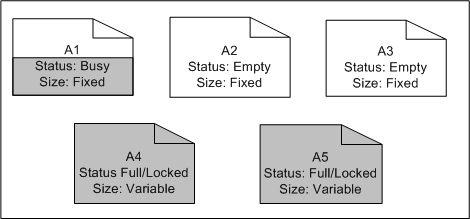Additional AI extents are needed when you are unable to execute an extent switch because all extents are full, and you are unable to empty the next extent in the sequence for reuse. If an extent switch cannot be performed, your database shuts down or stalls if you have enabled after-image stall.
To add additional AI extents, create a
.st file to define the additional extents, and use PROSTRCT ADD or PROSTRCT ADDONLINE to update your database. See
Using the OpenEdge Structure Add utility for details. When you add additional AI extents, they are added to the end of the extent list. PROSTRCT REORDER AI will move the new, empty AI extents so that they immediately follow the busy extent. Reordering your extents is necessary if the next extent in the switch sequence is not empty. This condition can occur if OpenEdge Replication has any of your full extents locked. The Replication lock blocks the user from using RFUTIL to empty the extent so that it may be reused. For more information on OpenEdge Replication, see
OpenEdge Replication: User's Guide.
Caution: PROSTRCT REORDER AI will rename AI extent files, changing the
.an extension. Area numbers for the reordered extents will also change. It is critical that you use PROSTRCT LIST to generate an accurate
.st file for the database after running this utility. For more information on generating a new
.st file, see
PROSTRCTLIST qualifier.
The following example illustrates the effect of PROSTRCT REORDER AI on your AI extents:

The following figure shows the original AI extent configuration. The database will shutdown when
A1 fills because it cannot switch to the full
A2 extent.

Adding the new extents is not sufficient to prevent a database shutdown. The database will still shutdown when
A1 is filled because after-imaging still can not switch to the full
A2 extent. Use PROSTRCT REORDER AI to arrange the extents. The following figure shows the result of the PROSTRCT REORDER AI.

After the reorder is complete, after-imaging can successfully switch extents. The result of the reordering is that the empty extents are moved to immediately follow the busy extent. Their area number and file name extensions have been altered to reflect the move. The physical location and size of the file on disk has not been altered.


